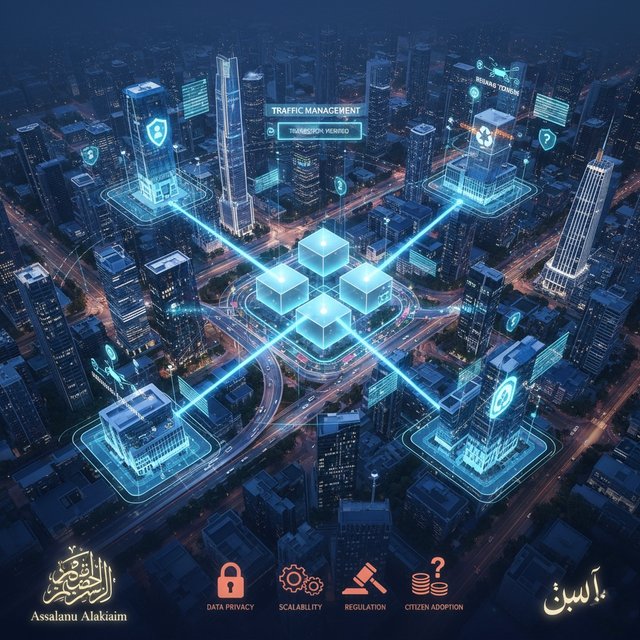Improving civic life
Assalamu Alaikum
A smart city is an urban area where advanced technologies are used to improve the management of citizen services, infrastructure, and assets. In these modern cities, blockchain technology can serve as a strong foundation, making data management more secure and transparent, and improving the quality of citizen life.
Secure Data Management : Blockchain stores this data in a decentralized and immutable ledger. As a result, it becomes impossible to tamper with or change the data. City authorities can be sure of the reliability of the data.
Identity Protection : Citizens can create a secure digital identity using blockchain. Using this identity, they can access government services, but do not need to disclose their sensitive personal data to third parties. Citizens can maintain full control over their data.
Transparent Transactions : When citizens engage in financial transactions or services with city authorities (such as paying taxes), blockchain ensures that the transactions are transparent and easily verifiable.
Traffic management : Using blockchain, toll collection, parking fee payment, and public transport payments can be completed automatically. When traffic data is recorded on the blockchain, it can be analyzed transparently to reduce traffic jams and make route optimization more effective.
Waste management : Every step of waste collection can be tracked on the blockchain, which ensures the accountability of waste management organizations. Citizens can receive blockchain-based tokens or incentives for recycling waste, which encourages environmentally friendly behavior.
Power supply and smart grid : Peer-to-peer (P2P) electricity transactions are possible using blockchain. Where citizens can sell excess electricity generated from their solar panels directly to their neighbors, without the intervention of a central power company. This increases the efficiency and transparency of the power system.
Data Privacy and Scalability : While blockchain secures data, maintaining privacy is a major challenge when storing sensitive citizen data. In addition, the blockchain network needs to be scalable enough to handle data from a large number of citizens and devices.
Technical Limitations and Cost : Setting up blockchain infrastructure is very expensive and requires high technical expertise. Many city authorities may not have the necessary knowledge or budget to build and operate such infrastructure.
Government Regulation and Law : Many countries do not have a clear law or regulatory framework on blockchain or cryptocurrencies. Legal and regulatory transparency is essential before adopting new technologies.
Citizen Adoption : This system will not be successful if citizens are not digitally literate and interested in using new technologies. Educating citizens about this new system and gaining their trust is a major challenge.
If these challenges can be overcome, blockchain technology can make smart cities more secure, efficient, and citizen-centric. Today's discussion concludes here. I hope you've found it interesting. Please share your thoughts on today's topic. Prayers for everyone. May everyone be well. Amen.


Twitter
https://x.com/BokhtiarMr90788/status/1976279592018334016?t=03ZekYtLg-ze94SqOx0h3w&s=19
https://x.com/PussFi_FNDN/status/1976277616815653211?t=03ZekYtLg-ze94SqOx0h3w&s=19
https://x.com/BokhtiarMr90788/status/1976280070311510496?t=McESwDt2lFxVih8okmkwyw&s=19
https://coinmarketcap.com/community/post/369339188
Such a clarifying read, Bokhtiar! öffentlich! I really loved your experience of detailing the role of blockchain in better civic life and smart cities. You excellently demonstrated how it boosts data security, transparency, and protection of citizens identity which are critical challenges in contemporary governance.
Your examples, in particular, traffic management and waste management, to peer-to-peer electricity sharing, were my favorite examples because they made the concept very practical and easy to visualize in case it is implemented in a correct way. 💡
I found your post insightful and realistic, in moderation, recognizing the strong and weak aspects such as regulation and scalability. On the whole, it is a highly educative article that outlines the role that technology can play in creating a superior civic future. It is a fantastic piece of work with this vision of the future! 👏
This is the great post of Improving civic life you have shared. There you have pointed some things that are knowledgeable for some people.